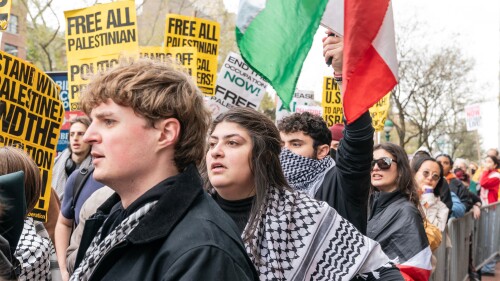Hassan Diab, a former Carleton contract professor, has returned home to Ottawa after being freed from prison in France.
On Jan. 17, Diab and his supporters held a press conference at Amnesty International Canada in Ottawa—just one day after he returned home after having spent three years in a French prison on terrorism charges over a 1980 Paris synagogue bombing.
In an interview with The Charlatan, Roger Clark, a spokesperson for the Hassan Diab Support Committee, described the impact the extradition had on Diab.
“He did not even have a chance to say goodbye to his seven-month pregnant wife, or his two-year old daughter. This was despite the fact that the Canadian government had 45 days to enforce the extradition,” he said.
Diab was kept in solitary confinement at the Fleury-Merogis prison in Paris, while French authorities conducted their investigation for his trial. At the press conference, Don Bayne, Diab’s lawyer in Canada, said he found this completely unprecedented.
“Extradition is only valid for a foreign country ready to try,” Bayne stated. “France was never ready to try [Diab].”
But, he said he believes that the real problem lies within the Canadian legal system.
“France delivered the justice that our court system failed to produce,” he said.
Diab, who taught sociology at Carleton and the University of Ottawa, was arrested by the RCMP in 2008 based on a request by the government of France.
In July 2009, as Diab waited under strict bail conditions, Carleton stated that a full-time faculty member would immediately replace Diab. According to an official statement from the university at the time, the move was made to provide students “with a stable, productive academic environment that is conducive to learning.”
Shortly before, the university was criticized for employing Diab by B’nai Brith Canada, a national section of the international Jewish service organization.
“The safety and security of the community as a whole, and of the Carleton University campus in particular, are of great concern to us,” the organization said in a statement.
In 2011, Ontario Superior Court Justice, Robert Maranger, ordered Diab’s extradition to France. Maranger stated that the evidence against Diab was “illogical, very problematic, convoluted, and with conclusions that are suspect,” but Canada’s extradition law forced his hand, leaving the final decision to then-Minister of Justice, Rob Nicholson.
“Canada signed an extradition treaty with the Republic of France, who suspect that Dr. Diab is responsible for a heinous crime,” Maranger said in his decision. “It is presupposed, based on our treaty with France, that they will conduct a fair trial, and that justice will be done.”
Diab was held at the Ottawa-Carleton Detention Centre under maximum-security until 2012, when he was ordered to be extradited to France by the Minister of Justice. His appeal wasn’t heard by the Supreme Court as the legal processes continued until November 2014, when Diab was then sent to prison in Paris.
Diab—who still awaits the French authorities’ pending appeals for his conviction—was in high spirits at the conference, but emphasized justice.
"[I’d like] to ensure that there are no more victims to matters such as these. I want there to be no more Hassan Diabs again,” Diab said.
He said he isn’t demanding any remuneration, but that the legal system must be amended for the future.
“It wasn’t a person who made the mistake,” he said. “The wrong is in the structure and the laws in place—that’s what I want compensated.”
This is not the first time that Canadian extradition laws have been questioned. In September 2017, Member of Parliament Don Davies presented a parliamentary petition that urged the Canadian government to bring Diab home. The petition was mostly promoted by the Hassan Diab Support Committee and signed by thousands of Canadians and permanent residents.
The committee, which has provided funding for Diab’s legal process throughout his nearly decade-long ordeal, working along with his wife, Rania Tfaily, presented its remarks at the conference.
“What matters today is that Hassan is free, Hassan is home, and Hassan is with his family,” a committee spokesperson stated. “But the trial is still not over.”



